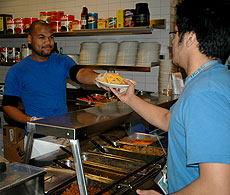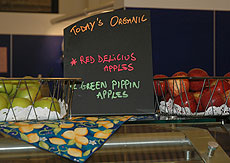November 14, 2005
UCSC at forefront of environmentally friendly dining
By Jennifer McNulty
From the organic farms where produce is grown to the compost piles that keep food waste out of the landfill, UC Santa Cruz Dining is at the forefront of environmentally friendly college food programs.
 UCSC
Dining assistant chef Miguel Rodriguez prepares burritos
to order in the Colleges Nine and Ten Dining Hall, above.
Twelve percent of the produce served in campus dining
halls last year was organic, below. UCSC
Dining assistant chef Miguel Rodriguez prepares burritos
to order in the Colleges Nine and Ten Dining Hall, above.
Twelve percent of the produce served in campus dining
halls last year was organic, below.
Photos: Jennifer McNulty |
 |
New guidelines mandate the purchase of organic, locally grown produce, the recycling of used cooking oil, the use of "paper" plates that are actually made of recyclable sugarcane fiber, and more.
These initiatives are already benefiting local farmers, local businesses, and the environment, according to Scott Berlin, associate director of UC Santa Cruz Dining.
"We are directly impacting individuals and the local economy," said Berlin. "We are creating new markets and helping preserve agriculture on the Central Coast."
Because of its $4.5 million annual food budget, the way UCSC Dining does business has major impacts. Among the milestones Berlin cited:
• Twelve percent of the produce served in campus dining halls last year was organic, six times the target set for the program's first year; organic production reduces the use of chemical pesticides and fertilizers.
• This fall, when UCSC started buying fresh, locally grown certified organic produce from an organization that partners with family farms and trains farm workers to run their own operations, the group's output increased by 300 percent in a single month.
• By signing a contract with a local food distribution business, instead of the national distributor that previously held the contract, UCSC is bolstering the local economy.
• Buying locally produced food helps the environment by reducing fossil-fuel consumption and air pollution; consolidating produce deliveries reduces the number of vehicles on campus.
"Santa Cruz is at the forefront of sustainability efforts in the UC system," said Berlin, who came to UCSC from the San Diego campus, where he was a food service manager.
And menus are changing, too.
"Our chefs are getting creative with all these vegetables," noted Berlin, touting roasted-vegetable pizzas, vegetarian lasagna, and potato-leek soup as among the new entrees.
The campus's leadership in sustainable dining is the result of work by a visionary group of students, staff, and faculty who worked together to create a full menu of dining-related programs focused on environmentally and socially sound purchases and practices.
Tim Galarneau, who graduated from UCSC in June, was the campaign coordinator for Students for Organic Solutions and a representative of the Campus Food Systems Working Group (CFSWG), both of which were instrumental in bringing about the policy changes. He and others hope their success at UCSC will serve as a model for other campus food service programs.
"UCSC Dining has raised the bar by addressing the social and economic impacts of food purchasing within the University of California," said Galarneau. "We hope it will inspire programs across the country to follow suit."
The changes coincided with the campus's transition to university-run dining facilities, finalized in June 2004, and they build on other "greening" efforts, including a successful organizing drive by students to introduce organic fair-trade coffee in the dining halls.
A campuswide survey last spring that generated 3,000 responses asked if students would be willing to pay more annually for meal plans to cover the costs of more sustainable operations. The majority said yes, according to Berlin.
That endorsement, which covered food purchasing guidelines as well as social justice issues such as union labor, gives credence to the campus's initiatives, said Berlin.
"It was the right thing to do, given the campus's philosophical and academic mission, and it's our job to marry that with fiduciary responsibility and keep room-and-board rates as low as possible," he said.
As part of its outreach and education efforts, UCSC Dining publicizes its waste-reduction efforts by presenting "facts to chew on." The Waste Reduction Committee produced a flyer illustrating the scope of the food waste problem: Based on a one-day sample of food waste generated by a single dining hall during the lunch hour, the committee calculated that patrons of UCSC's five dining halls could generate more than 50 tons of food waste annually just during lunch time.
The dining operation is reducing landfill waste by donating leftover food to the Second Harvest Food Bank, adjusting inventory levels and portion sizes to minimize overpreparation, preparing foods to order whenever possible, using vegetable and meat trimmings for soup stock, and rendering used grease, fat, and cooking oil.
More changes are in the works. The installation of a pulper at College Eight next month will reduce waste at the dining hall by 80 percent, added Scott Berlin, a member of the California Restaurant Association (CRA). The local chapter of the association is poised to launch a biodiesel operation, and the campus will contribute used oil as soon as that gets off the ground, he said.
For local farmers, the contract with the nonprofit Agriculture and Land-Based Training Association (ALBA) provides access to the potentially lucrative university market.
"Small farmers are daunted by the purchasing requirements of public universities," said Candy Berlin, program coordinator of UCSC Dining. "For organic farmers to be able to participate in a contract of this size is huge."
Among the local farms supplying fresh organic produce through the ALBA are Coke Farm, Phil Foster Ranches, Happy Boy Farms, New Natives/Greensward Nurseries, Swanton Berry Farms, and the UCSC Farm operated by the Center for Agroecology & Sustainable Food Systems.
The Berlins agree that most of the credit goes to UCSC students, who really pushed for changes in the dining operation.
"A lot of colleges are coming to us and asking, 'How did you make this happen?'" noted Candy Berlin. "It's really the students who deserve the credit. They are not only activists, they're willing to work. They'll scrape plates and gather statistics and information. They're not just making demands."
 Email this story
Email this story
 Printer-friendly version
Printer-friendly version
 Return to Front Page
Return to Front Page